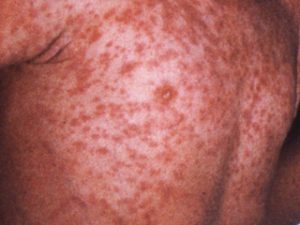
German measles, also known as tigdas-hangin or rubella, is a contagious viral infection that primarily affects the skin and lymph nodes. While it often presents with mild symptoms, it can have serious consequences for pregnant women and their unborn babies. Symptoms vary depending on the individual, as the body’s reaction to the virus differs from person to person.
Common Symptoms of German Measles
- Rashes or skin rash.
- The rash is the hallmark symptom of german measles. It typically starts as pink to reddish spots behind the ears or on the face and then spreads downward to the chest, abdomen, arms, and legs.
- The rash usually lasts for about three days and may be more prominent depending on skin tone.
- Flu-like symptoms.
- These include mild fever, cough, and a runny nose. These symptoms are more common in adults than in children.
- Other flu-like symptoms include a headache, red or irritated eyes (conjunctivitis), and general discomfort.
- Swollen lymph nodes.
- Enlarged and tender lymph nodes, particularly in the neck or behind the ears, may appear before or alongside the rash.
Symptoms in Specific Populations
- Children: Symptoms are often milder, and the rash may be the only noticeable sign.
- Adults: Adults tend to experience more pronounced flu-like symptoms, joint pain, and swollen lymph nodes.
When to See a Doctor
Seek medical advice if:
- You or your child develop a rash accompanied by fever or other flu-like symptoms.
- You suspect exposure to german measles, particularly if you or someone in your household is pregnant. Rubella during pregnancy can cause severe complications for the unborn child, such as congenital rubella syndrome.
Preventing German Measles
Vaccination is the most effective way to prevent german measles. The MMR (measles, mumps, and rubella) vaccine is part of routine immunizations in many countries and provides long-lasting protection.
German measles is a manageable condition for most individuals but poses significant risks during pregnancy. Recognizing its symptoms and seeking timely medical care are vital for managing the infection and preventing its spread. Ensure vaccination to protect yourself and those around you.


